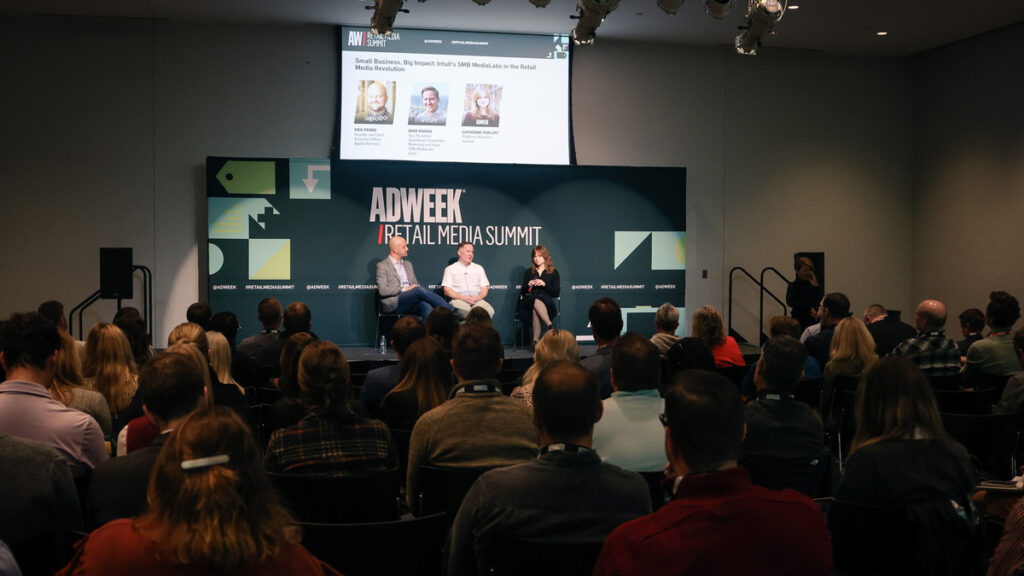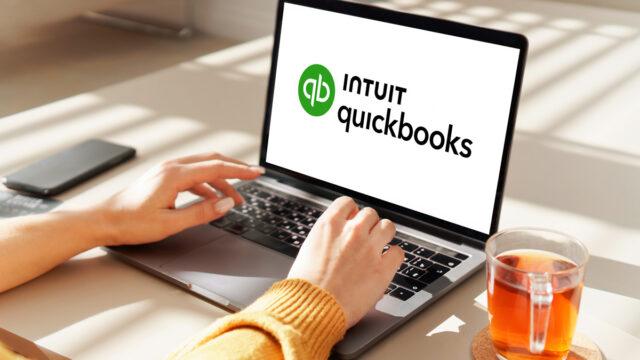The Big Impact of Intuit’s SMB MediaLabs on Small Business
Check out Commerceweek, Adweek’s destination for retail innovation. Enhance sales strategy across touchpoints with tips from top marketers. February 28-29 in NYC and virtual. Register.
By definition, Intuit’s SMB MediaLabs is an example of a corporation using its audience to start a media company. But on taking a closer look, it’s far from the traditional retail media network, a status that has helped it expand its customer base beyond endemic brands, B2B clients and across sectors.
The global finance tech company started its own small business-focused media network earlier this year after identifying a gap between advertisers and small business owners. After discovering the white space, Intuit quickly realized its very own proprietary data and product offerings could fill that void.
Intuit SMB MediaLabs VP Dave Raggio and Apollo Partners CEO and founder Eric Perko joined Adweek onstage in Minneapolis, Minnesota, at Adweek’s Retail Media Summit to unpack why integrating small businesses into the retail media ecosystem can drive results.
Trying to reach small businesses
Raggio noted how brands outside the B2B advertiser audience—that the product was originally built to serve—have been finding it useful to advertise to small businesses, confirming that its clients are evenly split between B2B and B2C advertisers.
“It’s large companies, like apparel brands, that are trying to market to construction companies … and trying to partner with small businesses on a regular basis,” added Perko from Apollo Partners, the agency that worked with Intuit to launch SMB MediaLabs.
Intuit’s network is attracting advertisers across the spectrum, anywhere from shipping companies to SaaS brands. The finance tech company sees it as an opportunity to learn about what advertisers are trying to do, the campaigns they are trying to run and so on.
“Really think about the audience and their needs,” advised Raggio to the event attendees. “Be able to think about what types of things they’re doing, products they’re buying [and] how it’s complementary to each other.”
The retail media network boom
In response to Google’s impending deprecation of third-party cookies, advertisers have had to scramble to find alternate solutions to reach consumers. One response: a tidal wave of retail media networks emerging, letting retailers reach people through first-party data.

With properties like tax preparation application TurboTax and email marketing platform MailChimp, it’s a natural fit for Intuit to use its own data on small businesses to help others reach the audience it connects with every day.
“Small business data is nothing like super business data,” said Raggio. “There are a lot of other products that can help these small businesses thrive and we help them connect with that.”
But Intuit is cautious about how it uses its data, only targeting users of its accounting program, QuickBooks, for now. Raggio confirmed to Adweek earlier this year that the company eventually plans to make Mailchimp customers available for targeting as well.
https://www.adweek.com/commerce/the-big-impact-of-intuits-smb-medialabs-on-small-business/
